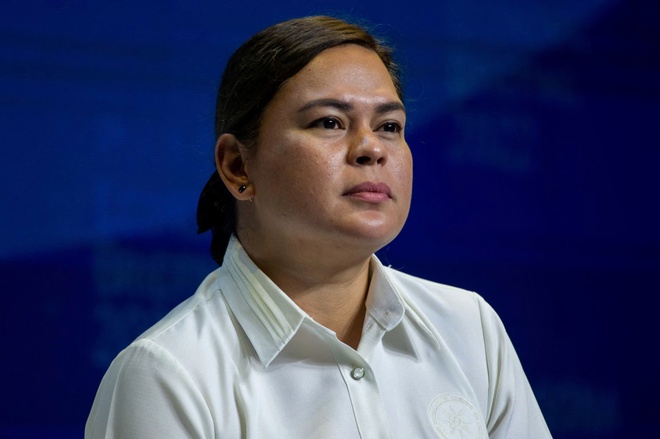In a surprising turn of events, Mary Grace Piattos has made headlines following her appearance in the popular public service program “Quadcom!” The show, which aims to inform and empower the Filipino public, has garnered significant attention, especially with the involvement of Vice President Sara Duterte, who recently released Piattos’ birth certificate. This revelation has sparked discussions across various platforms, leading to both curiosity and speculation about Piattos’ identity and her connection to the Vice President.
Mary Grace Piattos, a relatively unknown figure prior to her appearance on “Quadcom!” has quickly captured the public’s attention. Her presence on the show was marked by a compelling narrative that resonated with many viewers. During her segment, she shared her experiences and challenges, shedding light on issues that affect everyday Filipinos. This transparency and openness drew viewers in, creating a connection that many found relatable. Piattos’ story is one of resilience, and her emotional journey has touched the hearts of many who tuned in.
The release of her birth certificate by Vice President Sara Duterte has added another layer of intrigue to this unfolding story. By publicly sharing this document, the Vice President has not only validated Piattos’ identity but also positioned her as someone of significance within the political landscape. This move can be interpreted as an endorsement, suggesting that Piattos holds a certain level of importance or relevance in the eyes of the Vice President. The revelation has fueled speculation about what this might mean for Piattos’ future, both personally and professionally.

The impact of this event extends beyond the individual; it reflects the complex relationship between public figures and the citizens they serve. Vice President Duterte’s decision to release Piattos’ birth certificate can be seen as a gesture of support for individuals who may feel marginalized or overlooked in society. It underscores the idea that everyone has a story worth telling and that these stories can resonate with broader societal issues. By elevating Piattos’ narrative, Duterte highlights the importance of compassion and understanding in governance.
As discussions surrounding Piattos and her connection to the Vice President proliferate on social media, many are eager to learn more about her background and the circumstances that led her to appear on “Quadcom!” Viewers are curious about her personal journey, her family, and her aspirations. This newfound attention has placed her at the center of a burgeoning narrative, and many are waiting to see how she will navigate this spotlight. The public’s interest in her life will likely shape her future endeavors and opportunities.
The implications of this story stretch into the realm of politics as well. Vice President Sara Duterte, a prominent political figure and daughter of former President Rodrigo Duterte, has a significant following. Her endorsement of Piattos could potentially influence public perception and support for both individuals. As the public becomes more familiar with Piattos, she may find herself in a position where she can leverage this attention for advocacy or public service initiatives, especially those that align with her experiences and the issues she highlighted on “Quadcom!”

The media response to this situation has been robust, with various outlets covering the story from different angles. Commentators and analysts are weighing in on the potential ramifications of Piattos’ sudden rise to prominence. Some see it as a refreshing change, where ordinary citizens are given a platform to voice their concerns and experiences. Others, however, express skepticism about the motivations behind the Vice President’s actions, questioning whether it is a genuine attempt to uplift a fellow Filipino or a strategic move within the political arena.
Critics of this event argue that the release of a birth certificate, while significant, may also serve to distract from pressing national issues. They suggest that the attention given to Piattos could be a diversion from more critical matters facing the country, such as economic challenges, health care, and education. This perspective raises important questions about the nature of political engagement and the ways in which public figures choose to connect with their constituents.
Supporters of Piattos, on the other hand, view her emergence as a beacon of hope for those who feel unheard or invisible in society. They celebrate her bravery in sharing her story and commend the Vice President for recognizing and amplifying voices that often go unacknowledged. This sentiment is particularly poignant in a time when many Filipinos are grappling with feelings of disconnection from their leaders. The narrative surrounding Piattos reflects a growing desire for authenticity and genuine connection in politics.

As the story continues to develop, it will be essential to monitor how Piattos chooses to engage with her newfound platform. Whether she opts to pursue advocacy work, enter the political arena, or simply share her experiences, her journey will likely inspire many. The attention on her life and the support from Vice President Duterte may serve as a catalyst for positive change, not only for Piattos but also for others who share similar struggles.
Moreover, the impact of this situation could extend beyond the individuals involved. It may encourage more public figures to recognize and support grassroots movements and individuals who are making a difference in their communities. By fostering a culture of empathy and understanding, leaders can create a more inclusive political landscape where diverse voices are heard and valued.
In conclusion, Mary Grace Piattos’ appearance on “Quadcom!” and the subsequent release of her birth certificate by Vice President Sara Duterte have ignited widespread interest and discussion. This event encapsulates the complex interplay between personal narratives and political engagement, highlighting the power of storytelling in shaping public perception. As the public continues to follow Piattos’ journey, it will be fascinating to see how her experiences resonate with broader societal issues and inspire change within the community. The unfolding story serves as a reminder that every individual has a voice, and when given the opportunity, those voices can lead to meaningful connections and impactful change.



